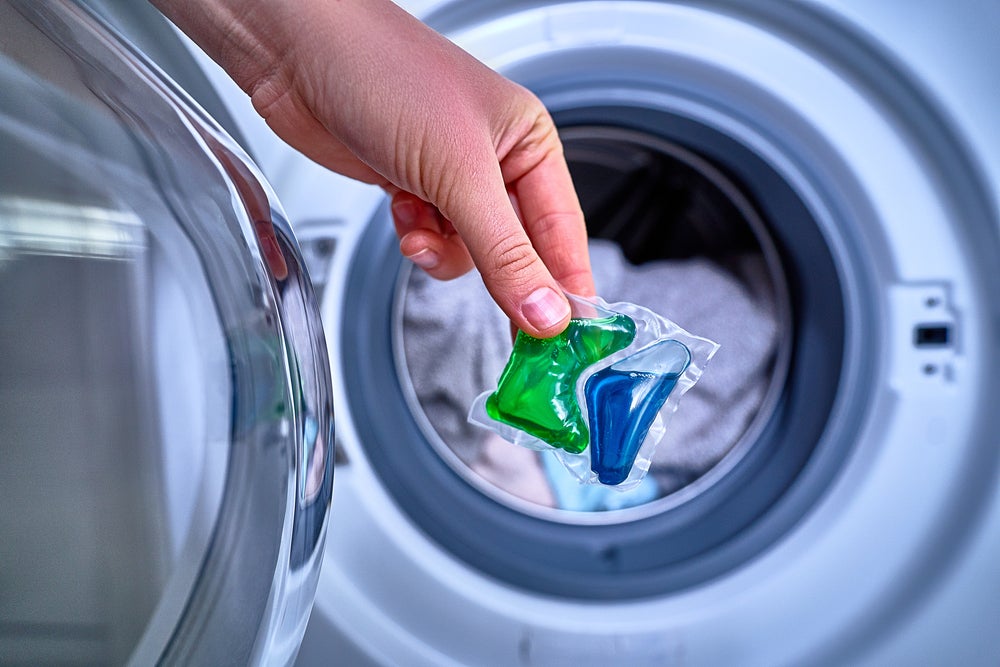Nearly all households in the UK buy laundry products; we all need to wash our clothes regularly. This equates to over 100 million plastic packs per year based on 2021 IRI market data, the majority of which have traditionally been produced with virgin plastics.

Inexpensive, easily made, versatile and durable; when laundry brands were looking for cheap, convenient packaging that protected products, plastic had the answer. The supply chains established to meet this plastic demand have been relied on for decades, and it’s clear that the threat to the environment is not enough for laundry’s big players to establish more sustainable packaging options with the urgency needed.
Promises have been made and targets set across the industry; the reduction of virgin plastics here, the movement towards PCR there. But none of laundry’s top brands are currently aiming to move away from plastic entirely.
The logistics and costs of overhauling almost the entirety of supply chains, coupled with the fact that plastic itself remains cheap, means that an impactful reduction of plastic has been replaced with conservative pledges and a brush of greenwashing by most.
What are the alternatives?
One of the big problems with the majority of plastics is the recyclability. Currently, most plastics only get recycled once before degrading to the point where it can no longer be used. Moreover, the majority of plastic packaging is still not being recycled in the UK, with only 9% of plastic being recycled worldwide, meaning even when they are trying to do the best with their packaging, customers are still unable to make the impact they want.
I’ve always said that the world’s best packaging is a banana skin but, failing that, paper runs a pretty close second. When managed responsibly and sustainably, the forests grown to supply paper mills can even have the added benefit of planting more than they take – and the world could use more trees.

US Tariffs are shifting - will you react or anticipate?
Don’t let policy changes catch you off guard. Stay proactive with real-time data and expert analysis.
By GlobalDataIn stark contrast to plastic, paper and card are also more readily recycled, with rates of over 80% in the UK, and it takes 70% less energy to recycle paper than it does to make it new from raw materials.
I don’t doubt that moving towards sustainable materials can pose a challenge. Laundry capsules, for instance, need to be sold in child-impeding packaging to reduce the risk of consumption by children. The child-lock has traditionally been delivered via injection moulded plastic – a function that’s difficult to replicate in more sustainable alternatives. Difficult but not impossible with some great design thinking.
Ultimately, the supply chains are built to run millions of the same pack, meaning the best option for the big guys is to design a plastic-free pack with a similar shape that can run down existing lines. To see dramatic changes we need dramatic solutions, and a dramatic overhaul of our industry’s approach to packaging.
The industry needs to wake up: Plastic is the enemy and we’re all in this fight together. The general public is wising up to the greenwashing of laundry brands and it is deeds not words they’re going to want to see.
Concentrate your products, reduce your packaging
Finding sustainable alternatives to plastic is the first and biggest step that needs to be made but there’s also efforts to be made in products themselves.
Many laundry detergents contain water or fillers that bulk out the product. Concentrated laundry capsules can be half the weight of most mainstream brands, with the benefit of saving space (and less packaging), and money (by using less product), which means fewer carbon emissions from fewer deliveries on the road.
The shifts that need to be made are sizable but such changes do good not only for customers but also for the planet. And it’s a shift consumers are crying out for – 93% of UK adults want companies to do more to protect the environment. Ultimately, the importance of sustainable alternatives for the 270 washes the average household in the UK gets through every year, is imperative and the collective power of the industry is fundamental.




